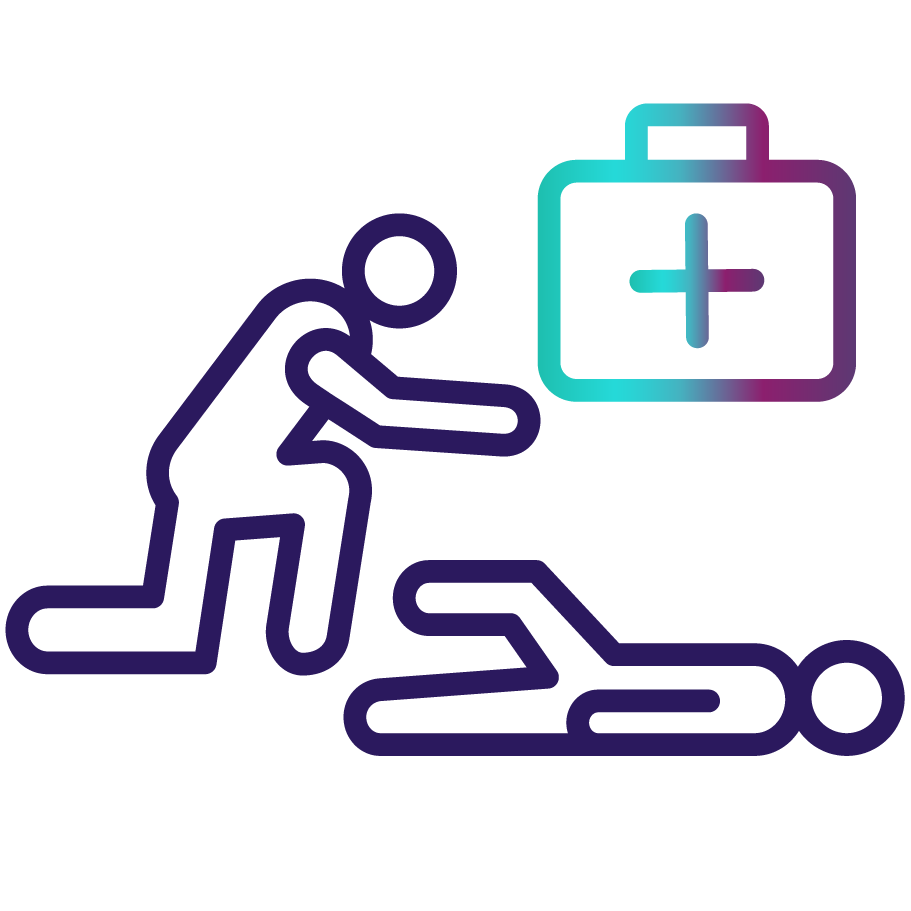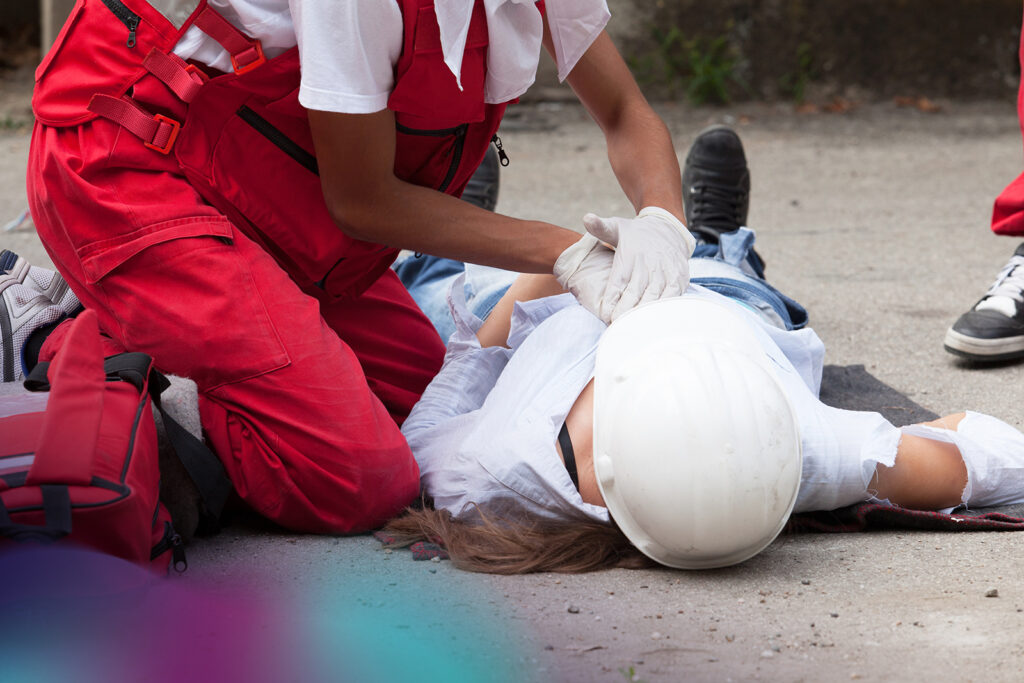Emergency First Aid at Work (EFAW)
The Emergency First Aid at Work (EFAW) course is a comprehensive one-day training program designed to equip individuals with the essential knowledge and skills needed to respond effectively to emergency situations in the workplace. This course is particularly suited for workplaces classified as lower hazard such as offices, retail environments and the like.
Key Features of Our Emergency First Aid at Work Course:
- Compliance with Regulatory Standards: Our EFAW course meets the Health and Safety Executive (HSE) requirements for first aid provision in the workplace, ensuring that your organization remains compliant with legal obligations.
- Certification and Recognition: Upon successful completion of the course, participants receive a Level 3 first aid qualification. This certification is widely recognized and validates the participant’s ability to perform emergency first aid in a workplace setting.
- Suitable for Various Needs: The course is designed for individuals who are obtaining their initial EFAW certificate as well as those renewing their qualification. This makes it an ideal option for both new first aiders and those needing to refresh their skills.

Course Content:
The EFAW course covers a range of First Aid knowledge. Participants will learn many skills including how to:

Perform Critical First Aid Techniques:
Master essential skills such as CPR, treating wounds, managing shock, and dealing with minor burns and fractures.

Respond Quickly and Confidently:
Gain the ability to act swiftly in emergency situations, including handling injuries and sudden illnesses.

Assess the Situation:
Recognize when a situation requires professional medical assistance beyond the scope of first aid.

First Aid at Work (FAW)
The First Aid at Work (FAW) course is an intensive three-day training program designed to provide individuals with comprehensive first aid knowledge and skills. This course is ideal for first aiders working in larger or higher-risk environments, where the likelihood of accidents and medical emergencies is greater. It equips participants with the ability to handle a wide range of medical situations confidently and effectively, ensuring the safety and well-being of employees in the workplace.
Key Features of Our First Aid at Work Course:
- Recognized Certification: Participants who successfully complete the FAW course will receive a Level 3 first aid qualification. This certification is widely acknowledged and respected, demonstrating the holder’s capability to deliver comprehensive first aid in a workplace setting.
- Regulatory Compliance: Our FAW course fully meets the requirements set by the Health and Safety Executive (HSE) for first aid provision in the workplace. By completing this course, your organization ensures it adheres to legal standards and is prepared for workplace emergencies.
Comprehensive Training for High-Risk Environments:
The FAW course is specifically designed to address the needs of workplaces with higher hazards, such as construction sites, manufacturing plants, and certain healthcare settings. The training includes a broad range of essential first aid skills, enabling participants to:

Handle Complex Emergencies:
Gain the ability to manage more severe injuries and illnesses, including those that are more likely to occur in high-risk environments.

Perform Advanced First Aid Techniques:
Learn crucial skills such as administering CPR, controlling severe bleeding, managing fractures and dislocations, and responding to medical conditions like heart attacks and strokes.

Make Informed Decisions:
Develop the capacity to assess situations quickly and determine the most appropriate course of action, including when to seek further medical assistance.
Why Choose the FAW Course?
The FAW course is ideal for organizations that operate in environments where the risk of injury is higher or more complex. It ensures that first aiders are well-prepared to respond effectively to emergencies, reducing the risk of serious injury or complications. By investing in this training, you not only comply with legal requirements but also demonstrate a commitment to the health and safety of your workforce.
In summary, the First Aid at Work course provides thorough and advanced first aid training, making it an essential investment for high-risk workplaces. It equips first aiders with the expertise needed to protect the health and safety of employees, ensuring a prompt and effective response to any emergency situation
Paediatric First Aid Training
The Paediatric First Aid Training course is a 2 day specialized program designed for individuals who work with infants and children. This course equips participants with the essential skills and knowledge to provide effective first aid in emergency situations involving young children. Whether you work in a childcare setting, school, or any environment where the care of children is paramount, this course will prepare you to respond confidently to a wide range of medical emergencies.
Key Learning Outcomes of the Paediatric First Aid Training Course:
- Understanding Legal Responsibilities: Gain a clear understanding of the legal requirements and responsibilities related to providing first aid to children. This includes knowledge of the regulations governing first aid in childcare settings and how to ensure compliance.
- Conducting Primary and Secondary Surveys: Learn how to perform thorough primary and secondary surveys to assess the condition of an injured or ill child. These surveys are crucial for determining the appropriate first aid response and prioritizing care.
- Administering Life-Saving CPR: Master the techniques for performing CPR on infants and children, a critical skill that can make the difference in life-threatening situations. The course also covers the proper use of defibrillators, ensuring you can act swiftly and effectively during cardiac emergencies.
- Positioning for Recovery: Understand how to safely place children and infants in the recovery position, a key step in maintaining an open airway and preventing further injury while waiting for emergency services.
- Managing Injuries and Illnesses: Learn how to provide first aid for a variety of common injuries and illnesses that affect children, including burns, fractures, choking, allergic reactions, and more. This comprehensive coverage ensures you are prepared to handle both minor and severe incidents.
Confidence in Action:
Upon completing the Paediatric First Aid Training course, you will gain the confidence and competence to take appropriate action in a wide range of scenarios, from minor injuries to serious accidents. You will know how to assess the situation, provide the necessary first aid, and determine when it is essential to seek further medical assistance. This course empowers you to act decisively, ensuring the safety and well-being of the children in your care.
In summary, the Paediatric First Aid Training course is an essential investment for anyone responsible for the care of infants and children. It provides comprehensive training, supported by valuable resources, to ensure that you are fully prepared to handle any emergency situation with confidence and skill.


Basic Life Support (BLS)
What is the Basic Life Support (BLS) Course for Health and Social Care Professionals?
For individuals working in health and social care settings, the possibility of encountering life-threatening situations is a reality, regardless of your specific role. The Basic Life Support (BLS) course is 3 hours and meticulously designed to equip you with the essential knowledge and skills needed to respond swiftly and effectively in emergencies. By taking this course, you will enhance your ability to provide safe, high-quality care, ensuring the well-being of those you support.
Key Learning Outcomes of the Basic Life Support Course:
- Rapid and Appropriate Response: Gain the ability to react quickly and appropriately during critical situations, where every second counts. This course empowers you to take immediate action, increasing the chances of a positive outcome in emergencies.
- Conducting Primary and Secondary Surveys: Learn how to perform both primary and secondary surveys, essential for assessing the condition of a person in distress. These skills enable you to make informed decisions about the most appropriate course of action.
- Mastering Life-Saving Techniques: The course covers vital techniques, including Cardiopulmonary Resuscitation (CPR) and the recovery position. These skills are crucial in stabilizing individuals until professional medical help arrives, and they can be the difference between life and death.
- Responding to Specific Emergencies: Understand how to handle a variety of emergency situations, such as choking, anaphylaxis, and other critical incidents. This training ensures you are prepared to manage different types of emergencies with confidence and competence.
Why the BLS Course is Essential for Health and Social Care Professionals:
In health and social care, the ability to provide effective basic life support is fundamental to ensuring the safety and well-being of those under your care. This course not only provides the technical skills needed for life-saving interventions but also instills the confidence to apply these skills in high-pressure situations. Whether you are a caregiver, nurse, support worker, or any other professional in the sector, this training is invaluable.
In summary, the Basic Life Support course is a vital resource for anyone working in health and social care. It offers comprehensive training that enhances your ability to deliver life-saving assistance, making you a more capable and confident caregiver in emergency situations.
Annual First Aid Refresher
The Annual First Aid Refresher Course is a 3-hour training program designed for individuals aged 16 and over who wish to maintain their first aid skills and stay informed about any updates in first aid practices. The Health and Safety Executive (HSE) strongly recommends that first aiders undergo annual refresher training to ensure their skills remain sharp and up-to-date between their initial certification and the three-year requalification period.
Who Should Attend?
This course is ideal for anyone who has completed a First Aid at Work or Emergency First Aid at Work course and holds a valid certificate. The HSE advises that all certified first aiders take this annual refresher to reinforce their existing knowledge and boost their confidence in delivering first aid when needed.
What Does the Annual First Aid Refresher Course Cover?
The refresher course provides a comprehensive review of essential first aid procedures such as CPR, recovery position, sling etc.
Why Take This Course?
While this course is not certified, it is crucial for keeping your first aid skills current and effective. By participating in the Annual First Aid Refresher Course, you will reinforce your ability to respond to emergencies with confidence and competence, ensuring that you are always prepared to provide high-quality first aid when it matters most.
In summary, the Annual First Aid Refresher Course is an essential training opportunity for certified first aiders. It ensures that your skills remain sharp and that you are fully prepared to respond to any emergency, maintaining the highest standards of care and safety in the workplace.

